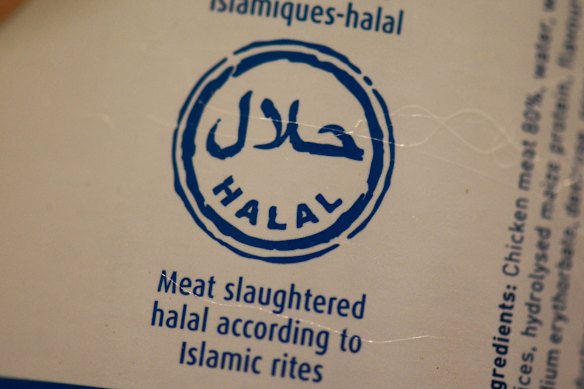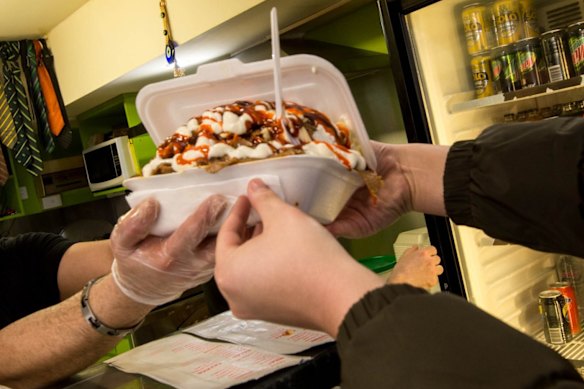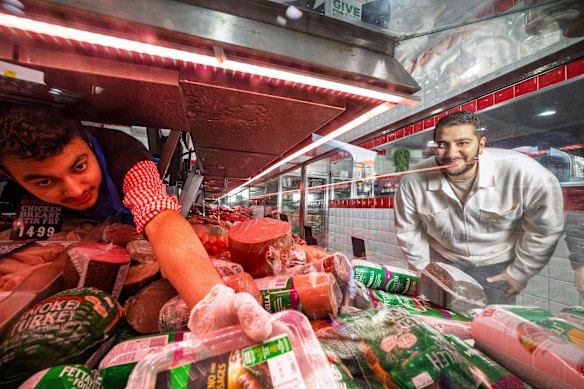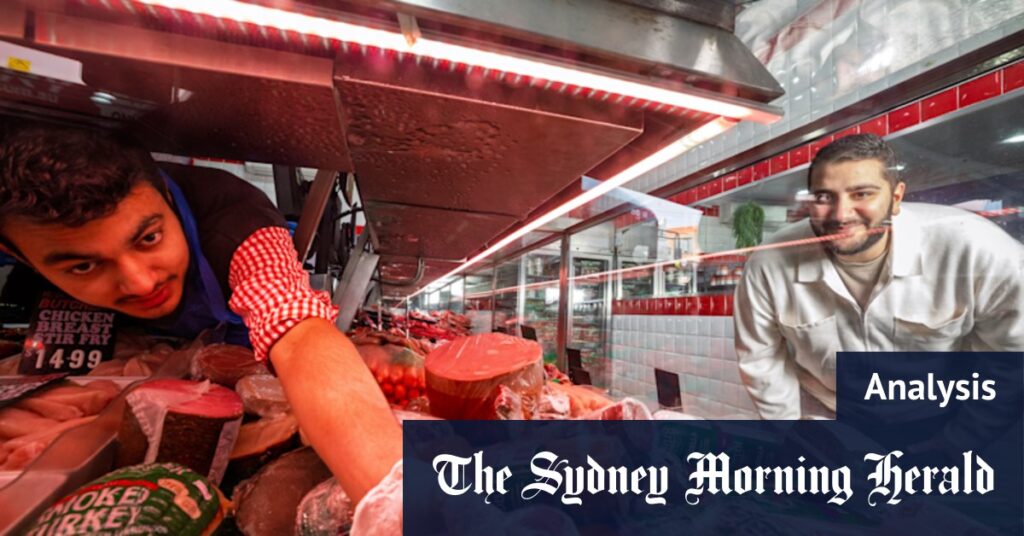Faced with the overwhelming task of sifting through the varying standards of halal certification in Australia, Mohammad Omran did what any self-respecting Muslim would do: start a WhatsApp group.
The 1000-member-strong group called “Halal Food Sydney” is a space where Sydney-based Muslims ask each other whether various foods or drinks are halal, the Muslim standard for consumption.
“There are thousands of consumers who want clarity on what is and isn’t halal. And we can see for ourselves inconsistencies in what is certified. We see them and have our doubts. And we know it shouldn’t be like this.”
Mohammed Omran (right) at Punchbowl’s Abu Ahmad Butchery. He believes a domestic halal certification standard would be the best solution.Credit: Sitthixay Ditthavong
What is halal?
Muslims have a standard they must abide by for food and drink. Everything must be halal, which generally covers ethical farming and slaughtering, as well as avoiding cross-contamination with anything that isn’t halal, like pork or alcohol.
The post-WWII generations of Muslim migrants established a halal certification industry, where companies (initially, small, family-run affairs in western Sydney and northern Melbourne) could check to see if a butcher or restaurant was halal, and give them the tick of approval for the fledgling Muslim community.
For decades, the industry operated without a governing body, standardised guidelines or any accountability, creating a freewheeling industry plagued by allegations of mismanagement, dishonesty and corruption.
Many Muslim consumers who care deeply about their faith and how it is practised no longer trust the certifying industry and its processes.
“We have become our own food scientists, food technologists, our own religious law interpreters,” Omran says about the group.
“And we’ve made difficult decisions, but we shouldn’t have needed to do that. We should be able to rely on leaders in our community. But without transparency, without trust in the processes, what other option do we have?”
And as Omran puts it, the issue is a “fundamental” one.
“We need a place to pray without fear of harm, we need to be able to practise our religion, and we need to be able to know what is and isn’t halal. Or we just go vegetarian and boycott the whole system.”
What has changed?
The halal certification business in Australia faces a tipping point after exploding into a billion-dollar industry.
The growth was launched when major grocery chains Woolworths and Coles waded in and began offering fresh halal meat, as major butchers and suppliers seek to meet the skyrocketing demand for Australian halal meat in South-East Asia and the Middle East.
These elements came together in an industry roundtable meeting held in July, where certifiers and suppliers opened conversations on regulating the domestic market, the first step in what could become a game-changing moment for the growing sector.

Who is setting the standard for what is and is not halal in Australia?Credit: Justin McManus
Omran was there as a representative of “Muslim consumers” and challenged those in attendance to meet the demands of the community, to become transparent and consistent.
This push from a chaotic industry to one that is organised and self-regulated represents an evolution faced by many migrant communities and the economies they build.
The pressures and focuses are different for those who came and built the industry in the suburbs of Sydney, Melbourne and Brisbane: in the early days the priorities were survival, security and speed. They needed these systems up and running as soon as possible, no matter how dodgily set up.
But the needs of the generation that has come after them are different, seeking instead stability and credibility. They want structures that can enable their ambitions and respect their demands, ones that require legal frameworks, connections with the rest of the economy and community support.
The halal certification industry is torn between a community seeking survival and one that wants to grow and thrive.
What even is halal certification?
Halal certification emerged as an industry in the late ’70s, as Muslim migration to Australia grew and the community sought to establish the religious infrastructure they needed.
These were usually small outfits that would offer a certificate to butchers or restaurants that signified their products or services were halal.
That would come with a literal certificate that could be found pinned up behind counters at these shops and restaurants, assuring Muslims they could eat there.
How big is the industry today?
The halal certification industry is split between two main sections: export and domestic.
The export side is more organised, tightly overseen by federal bodies such as the Australian Government Authorised Halal Program. While data is scarce on the exact values of the export side of the industry, one research paper from Tridge, a global data and media company that focuses on agricultural industries, said Australia exported about $2.36 billion worth of halal meat in 2021.
And that is only increasing, with data from Volza, an export-import data platform, showing a 22 per cent increase in volume between September 2023 and August 2024, most of which went to the Middle East and South-East Asia.

A halal snack pack being sold in Melbourne.Credit: Penny Stephens
There are 25 halal certifiers authorised by the government to certify meat for export, and they act as gatekeepers to these lucrative markets. Without certification, the meat cannot be exported to Muslim countries.
But part of the success of this growing export industry is demand and reputation. Australian meat has a premium reputation across these markets, and any questions surrounding the halal certification process could jeopardise this.
The domestic side is a fractured and inconsistent industry that remains unregulated. No official count exists for the number of domestic certifiers, although some industry insiders estimated there are about 30.
This decentralised landscape has produced confusion among consumers, both Muslim and non-Muslim. It’s not clear what is and isn’t halal, by what standards, and how the industry operates. This opaqueness was exploited by racist fearmongering in the past, including via rumours halal certification funded terrorists.
A 2015 Senate inquiry called the system “lacklustre” and highlighted the risks of fraud, unclear labelling and a lack of consumer confidence. This has led to communal efforts at categorisation, such as Omran’s WhatsApp group.
Who does the certifying?
The industry, estimated to be worth about $1.7 billion according to the Muslim World Research Centre, is marked by fierce competition. About 30 companies are vying to certify suppliers and manufacturers, ranging from large grocery chains to small goods suppliers.
But the small-scale roots of the industry meant there was no regulatory body or broad guidelines adopted. It was each to their own.
Each certifier was free to come up with their own process and standards. The barrier for entry was, and remains, very low, and anyone with an interest can begin a certifying business.
With such an open-ended industry, tracking who does the certifying and how can be very difficult. Some major players, such as the Supreme Islamic Council of Halal Meat in Australia and Halal Certification Authority Australia, have been in the market for decades. There are also new players, such as Global Australian Halal Certification and Australian National Imams Council Halal Authority, which are attempting to elbow their way into the market.
The issues
While the open-ended nature of the industry and the lack of guidelines has produced some healthy competition, there is growing discomfort from within the industry at the lack of guardrails.
The Arab Chamber of Commerce (AACCI) hosted the roundtable of halal certifiers and stakeholders in July, with the goal of opening a conversation on the industry’s future.
About a dozen industry bodies turned up, and central to the conversation was whether a minimum standard could be codified, whether that would work and how it would be policed.
Mohamed Hage, the president and national chairman of AACCI, said the event was focused on making the industry “more efficient, more transparent and more competitive”.
“Making this process more efficient is good for business and good for the economy.”
Hage said it was essential the Australian certification process could be trusted by both domestic and global consumers.
“Reputation matters in this industry, and Australia exports billions of dollars’ worth of halal goods. It’s important our domestic process has a good reputation among global consumers to ensure we can continue to grow.”
The head of a halal goods manufacturer, who asked to remain anonymous so they don’t jeopardise their relationship with certifiers, told the Herald that the lack of oversight has led some certifiers to undercut each other, offer certificates without proper checks or, at worst, mislead their consumers about their own standards.
“If Muslims knew that some certifiers approve suppliers where there is cross-contamination (with pork products) or that some manufacturers are certified without proper checks, I guarantee you there would be a lot of anger,” they said.
“There is a level of trust by the community in suppliers that is not being respected,” they added.
A recurring issue the manufacturer raised was the inconsistency of the standards being applied, and how that has been exploited by big suppliers or manufacturers.
“If a certifier has a more thorough, expensive process, and another has a very lax, very cheap process, why would you as a non-Muslim business make the more expensive choice? It’s not about the businesses, it’s about the standards of the certifiers,” they said.
Where to from here?
The AACCI event ended with agreement that a group of certifiers will meet in September to thrash out a potential minimum standard and how it could be implemented.
It could lead to an Australian standard being developed and adopted, one that would force suppliers, manufacturers and retailers, big or small, to abide by new regulations. It would also mean the potential for undercutting or corrupt conduct is reduced, and streamline the process for new customers and businesses.
It may be the biggest shake-up in the history of the industry, one that could thoroughly change the make-up of suppliers. It would potentially lead to the professionalising of this migrant-based industry, and change how the community sees halal certification.
It also means exports could grow exponentially, particularly if Australia creates a world-leading standard that would only improve its already positive reputation. It would cement Australia as a permanent supplier to growing and established markets, and provide clarity for local suppliers that want in.

Punchbowl’s Abu Ahmad Butchery.Credit: Sitthixay Ditthavong
The local Muslim community would be able to abandon their ad-hoc attempts at certification, and an industry-wide standard would be exactly the kind of measure that would alleviate the confusion that led Omran to create his WhatsApp group.
But that is only if the industry bodies that have agreed to meet in September agree on a standard. The community, industry bodies and the government all have their eyes on one meeting that could reshape an industry.
Over to them.
Start the day with a summary of the day’s most important and interesting stories, analysis and insights. Sign up for our Morning Edition newsletter.
Read the full article here
